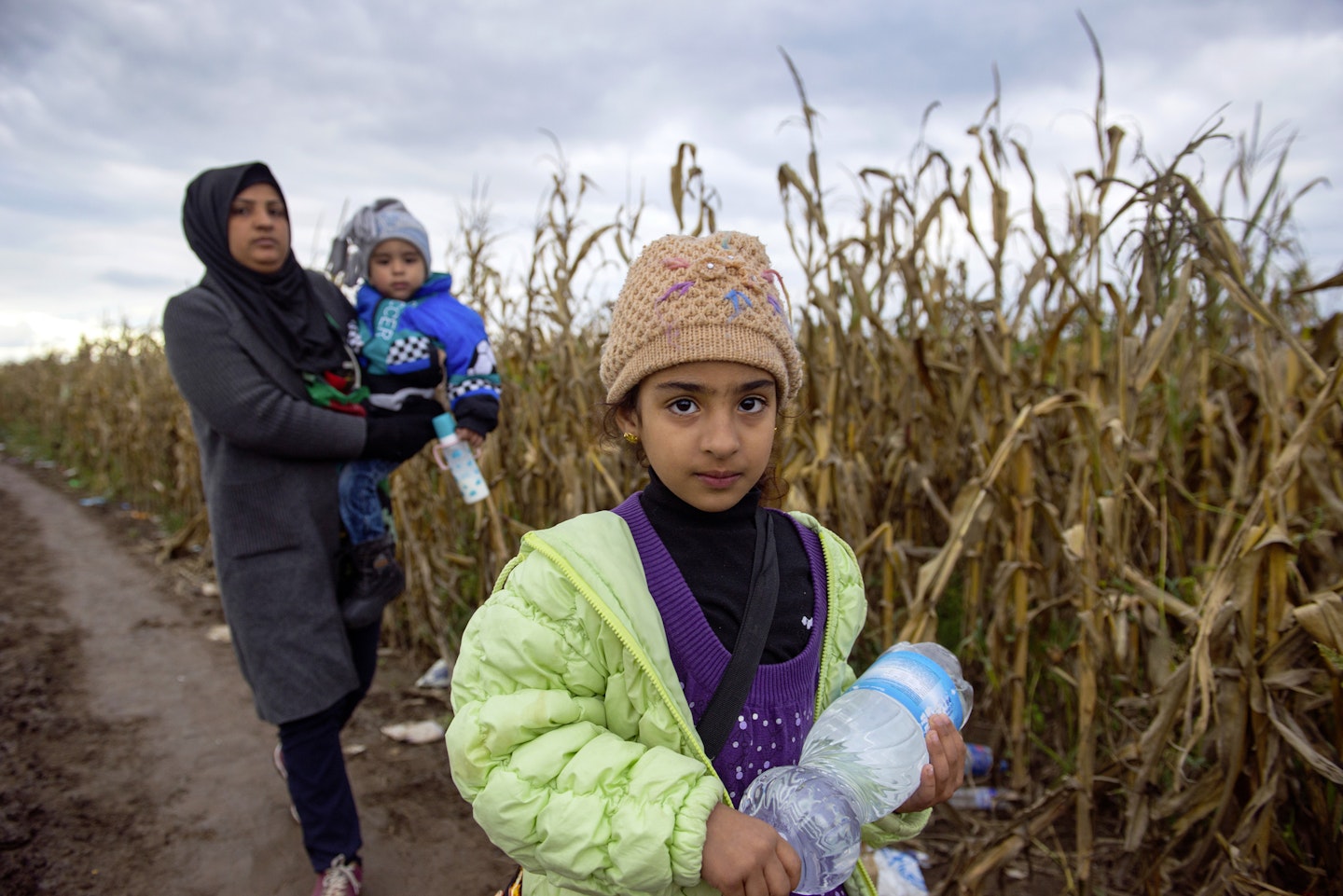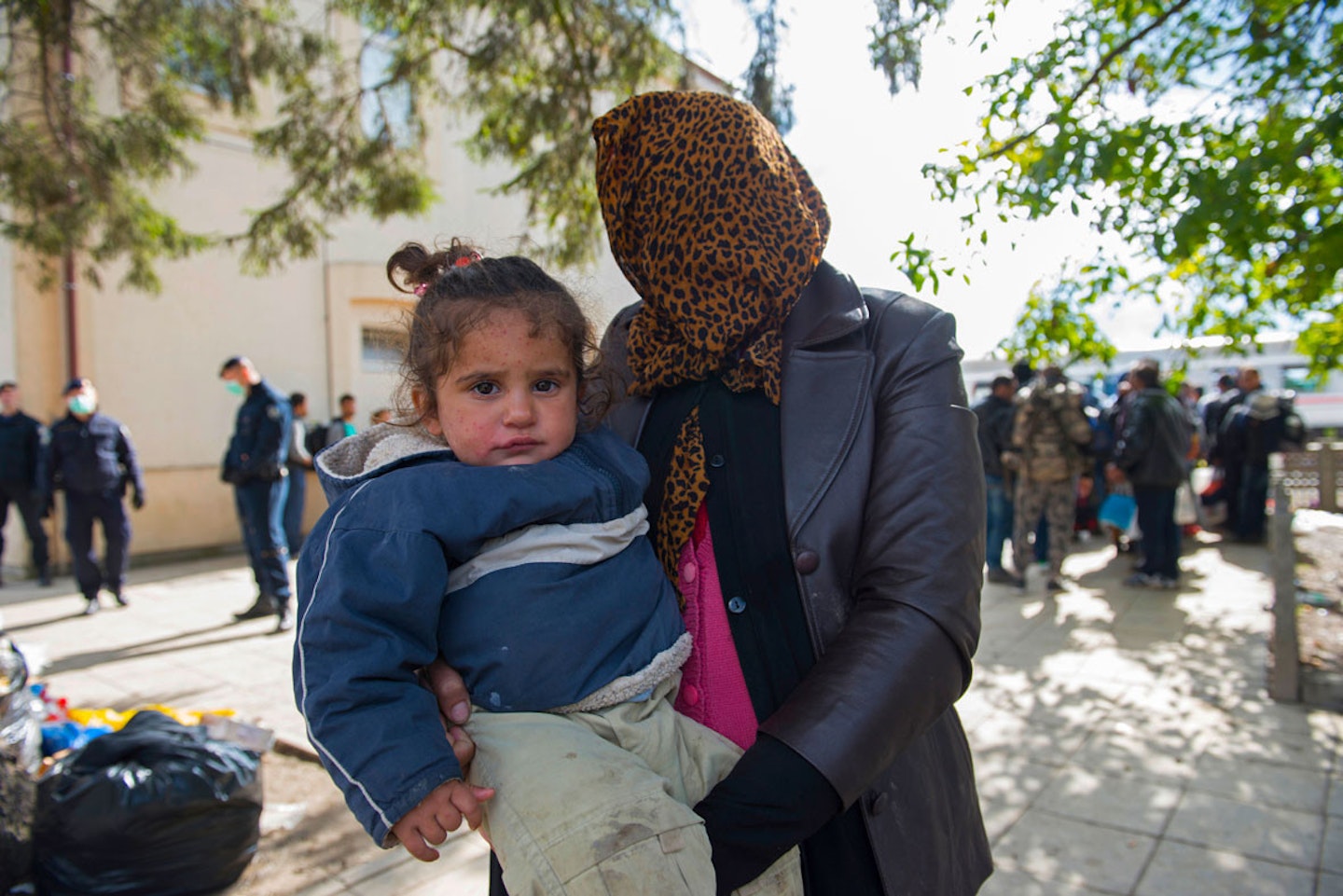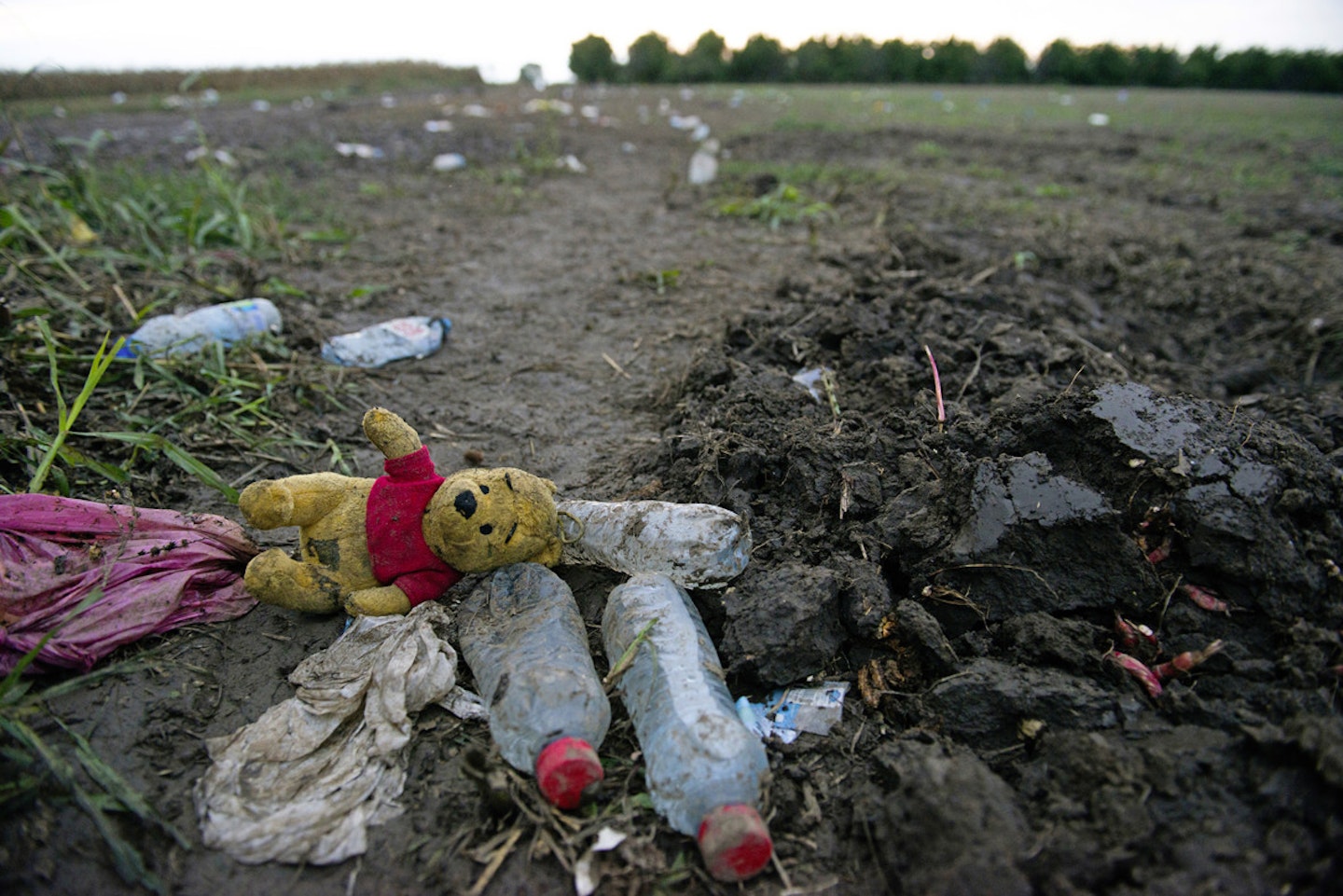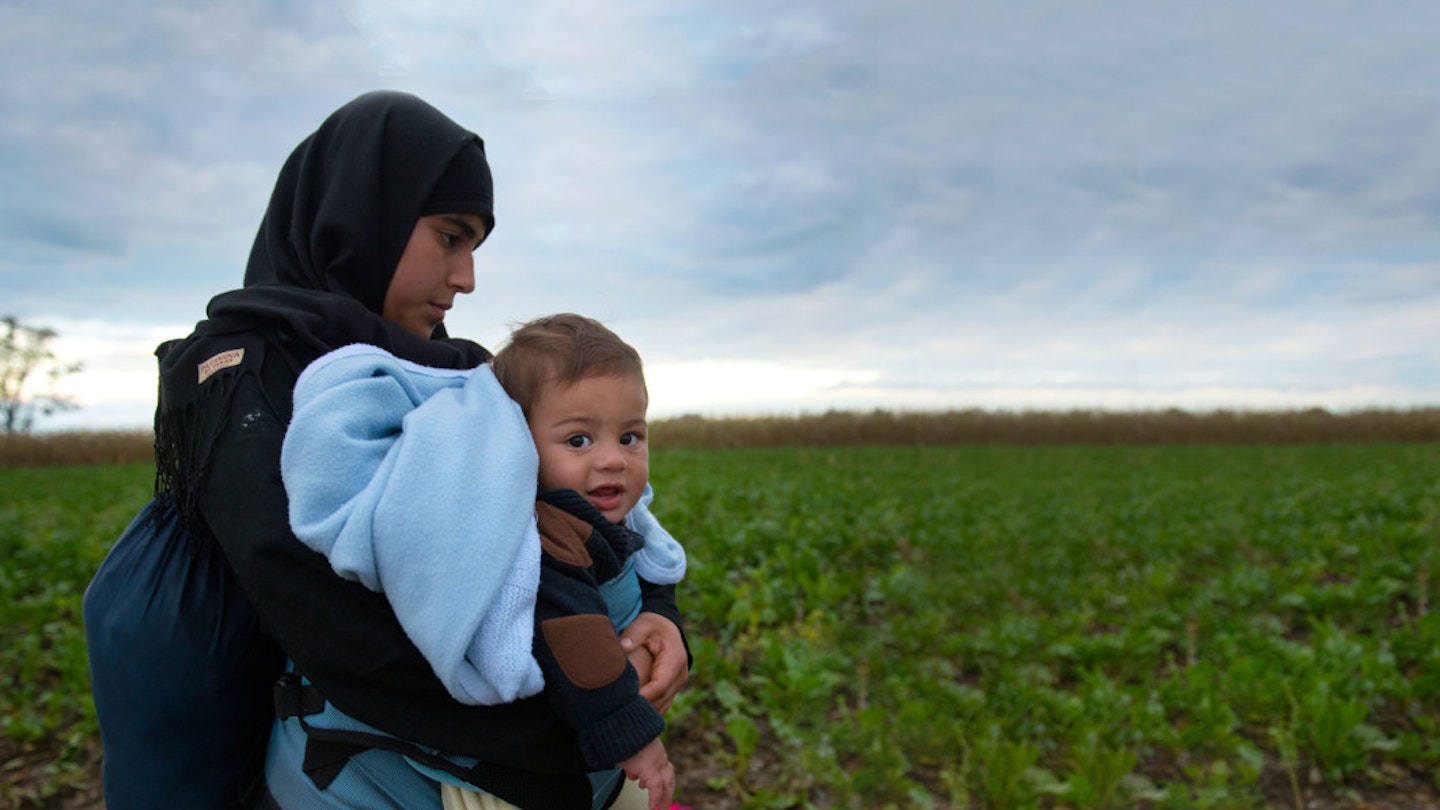Winter's on it's way and conditions are worsening for the tens of thousands of refugees crossign Europe. Zoe Beaty travels to Serbia to meet them and to find out how Grazia readers can help their future
'I’m cold, I’m tired,’ Dinah says, each word weighted with exhaustion. It is dusk, just before night obscures visibility to a few short yards, and we’re walking what Dinah hopes is the path to a better life; a journey of around three miles to the Serbian border with Croatia. She’s rushing to avoid the rain but her one-year-old son is heavy on her small frame, and every few steps her feet stick in the mud, sodden from an earlier downpour.
In another life, aged 18 Dinah might have been worrying about studies and updating her Facebook status. Instead, she’s been travelling for two weeks, surviving on biscuits and sleeping on the street for the last few days. Her home in war-torn northern Iraq was hit by a grenade while she was sleeping – her son’s father was killed instantly. ‘I have no mother, no father,’ she explains. ‘I have no family left.’
By Wednesday last week, Dinah had already travelled more than 3,000km – yet was still far away from her dream of finding safety in Denmark. Each day in September, an estimated 4,000 more refugees entered the country, bringing the total to almost 70,000 in just over a fortnight. The scale is overwhelming: 50 at a time arrive on buses from Macedonia (a 10-hour drive away), and tens of coaches can arrive every hour.
The unprecedented influx has instigated political unrest across the continent – and has become the first international crisis in which social media has played an integral part. Twitter hashtags, Facebook posts and campaigns like the one featured in Grazia last month raised hundreds of thousands of pounds for emergency aid. Unsurprisingly, pictures don’t come close to showing the true scale of the crisis – or just how crucial your donations and care packages have become. With winter fast approaching, people like Dinah need them more than ever.

When I arrive in Serbia with CARE International, it is cold and the sky is forebodingly black. ‘Most people have nothing but what they’re wearing,’ says Laura Gilmour, who works for the humanitarian charity. ‘As winter quickly sets in, the rain worsens and temperatures drop, especially at night. Many don’t even have dry socks and shoes.’
There’s nothing, we can’t do anything,’ says Tamara – walking from Serbia to Croatia – when I ask if women have access to sanitary products without the help of aid packages. ‘Sometimes we don’t feel safe. But we pray the will of God is with us.’ The money you have given has not only helped charities to respond with fresh fruit, tea, medical assistance, baby food, bread and nappies, but winter essentials such as hot soup. CARE International is already mobilising new care packages to include underwear, ponchos and plastic sheets.
The aid is a lifeline – yet it is becoming more difficult to provide. Serbia has seena huge rise in refugees following nearby Hungary’s dramatic – and widely criticised– decision to close its borders, tear gassing and hosing down men, women and children in an alarming police crackdown.
‘This is not about rich and poor,’ Fariah, a young mother of four, says when we meet her at the heavily policed Croatian train station of Tovarnik, where refugees are taken after they have walked across the Serbian-Croatian border in order to try to reach Hungary. ‘There is no rich and poor in Syria now. When everyone can be killed, when everyone is scared their children will be killed, there cannot be.’
Fariah and her husband, Saddam, 26, travelled through Turkey after their home was bombed, then took a boat to Greece.‘It was supposed to hold 15 people, but there were 50 of us,’ says Saddam, who has a lengthy scar across his cheek caused by a government airstrike in Syria. ‘Earlier that day, 50 people died at sea. But we had no choice.’ He looks at his eight-month-old son and explains why they had to leave.‘My cousin had a son born on the same day,’ he says, motioning his finger across his son’s neck. ‘ISIS slashed his throat.’

Other refugees have equally harrowing stories. An Iraqi police official, Mohammed, 46 – travelling with his wife and two children (aged eight and two) – was told if he didn’t conspire with armed forces his family would be bombed while they slept.
Gaby, a 26-year-old accountant, watched his cousin being killed by a sniper in Damascus and endured being kidnapped by ISIS on his way home from work. ‘They confiscated our phones to search for intelligence about the regime. Some girls were beaten when their captors found anti-ISIS jokes on them.’
Now that they’re fleeing for their lives, ‘Social media and mobile phones have become so important,’ explains Danjela Korac- Mandic, programme coordinator of Novi Sad Humanitarian Centre. ‘People can stay in touch with their families – but we are seeing more people using Facebook groups to communicate safe, quick routes. It’s crucial for them to be in contact with those who have travelled ahead of them, so we are now planning to install charging points where we give out CARE packages.’
Sexual violence and safety for women is an increasingly serious problem. ‘Even going to the toilet can be an issue,’ explains Danijela. ‘Unisex shower blocks often mean women cannot shower; it’s undignified for them. We are trying to fix that.’

Back at the border crossing, as darkness falls and 7ft cornfields tower over us, the miles stretching off into the unknown feel ominous. It’s hard not to feel uneasy, but their plight is not for the faint-hearted. Each person has lost; each has risked everything to get this far. We see men dragging a pushchair through thick mud and women crossing alone with children, shoulders hunched with exhaustion. They haven’t eaten a decent meal in weeks. ‘Our stomachs hurt,’ says Tamara.
But still, as we walk, the women smile and laugh. There are at least six buses – or around 300 people – arriving at the crossing point from the hours of 5 to 7pm, and many sing or chant, and say hello. They have barely any possessions, barely any money – but what they do have in abundance, despite all they’ve seen, is hope.
‘I don’t care what happens to me,’ Dinah says, stepping into a police van taking her to a camp for the night. Tomorrow, she’ll take a train to Hungary, and hopes she can cross the border before it’s closed off, reaching Germany and then Denmark. ‘I just want a future for my son. I have hope for him. I want him to live where there is hope too.’
